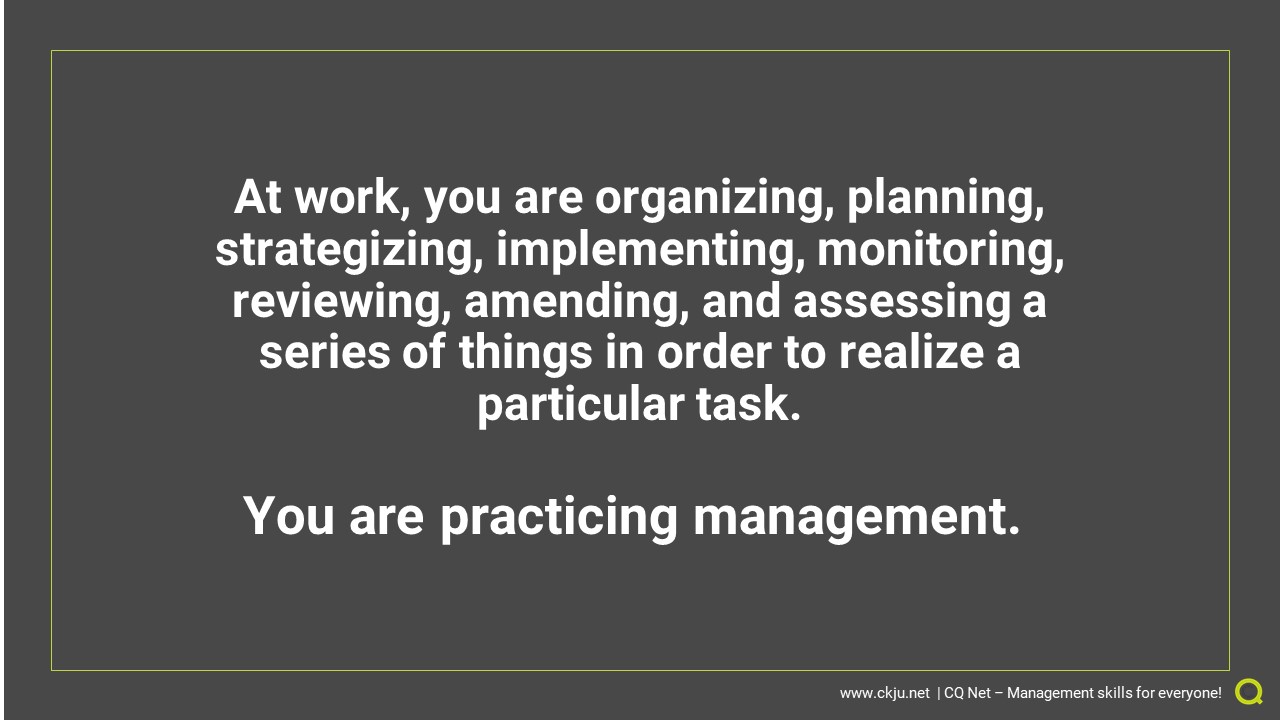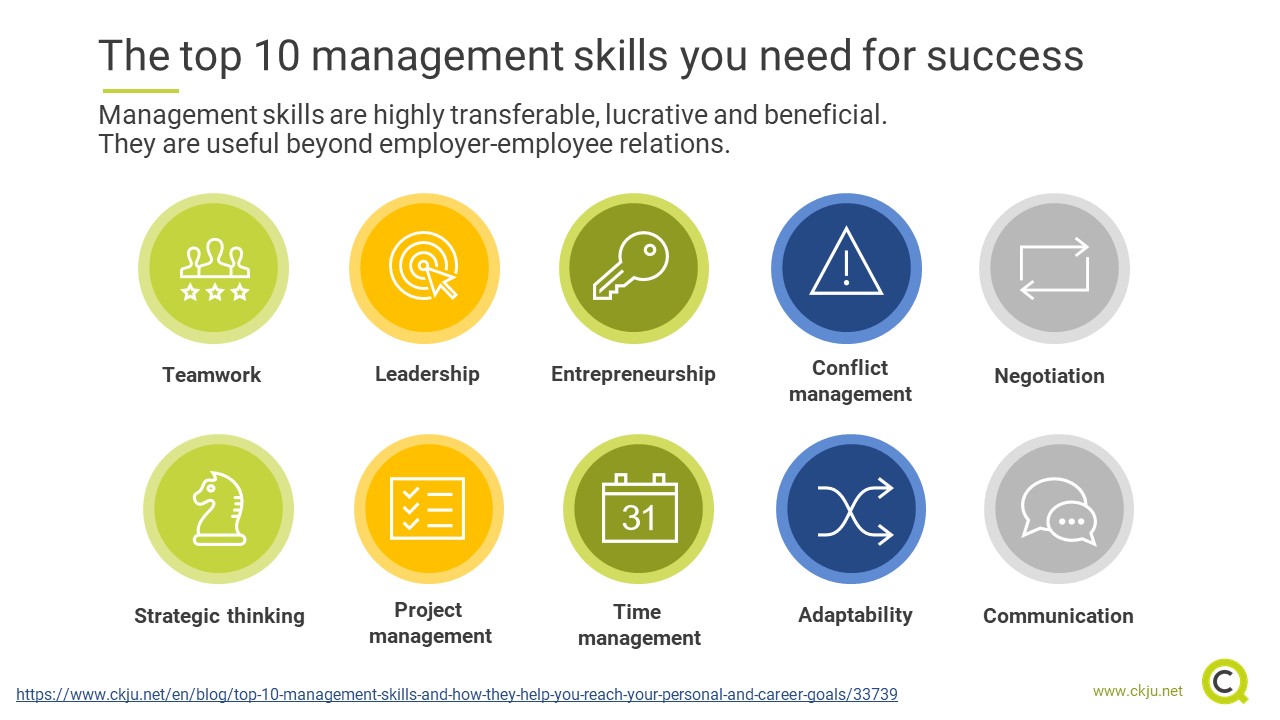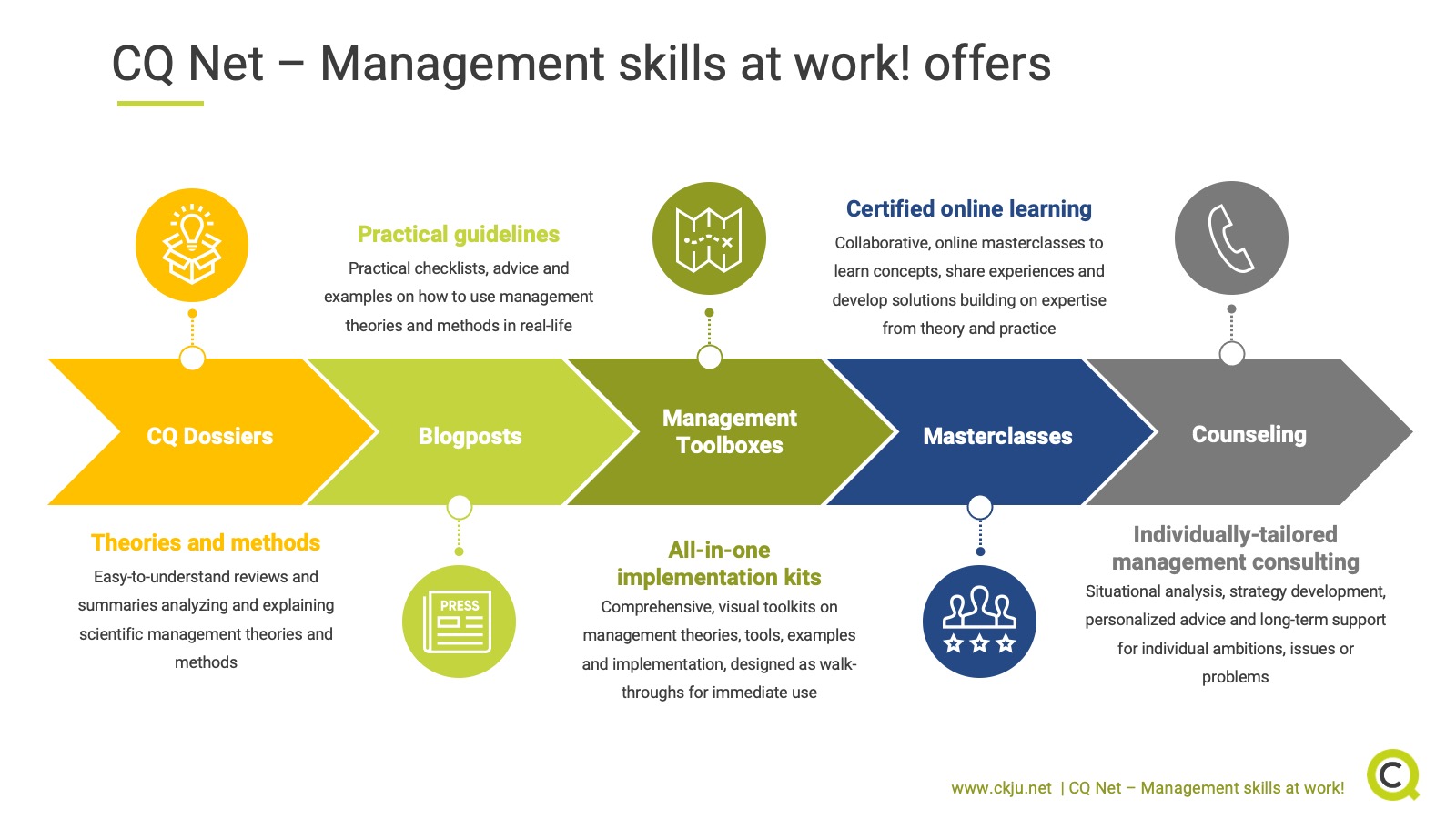- Blog
- Management demystified
Contents
From typical managers to typical professionals
It is not surprising the picture of the “typical manager” sticks – it is what we learn in textbooks and what is reflected in the way most organizations are managed: hierarchically, with those with more power at the top. Of course, in many cases, the stereotype might also be true. We often tend to think of managers as experienced, well-versed and talented people in high-paying positions that enable them to make important decisions, which influence others.
It has only been more recently that also women are included in this assumption, and even more recently that we acknowledge that the competencies usually attributed to managers can and must in fact be shared, practiced by others, and may not be as clearly linked to certain power positions as previously assumed.
Management skills and competencies are hidden in everyday tasks
This very logic, namely that management actually concerns everyone in organizations, is ever-growing but seldom referred to explicitly. Skills like project management, teamwork, communication and so on are all “management tools”, which are increasingly outsourced from those in top power positions to those lower in the hierarchy. “Managers” are no longer the only strategists in organizations who delegate, ensure things function, and worry about the administrative processes behind an organizational vision.
Nowadays, we understand that organizations are more interconnected entities that create their own culture, set of rules, norms and practices. As such, the boundaries between different competencies, responsibilities and actions are blurred – the whole organization is the sum of its parts.
Management means achieving certain objectives
Are organizations really that interconnected? Even as a “regular, standard employee” you are an indispensable part of the organizational puzzle. You are one important gear in the complex machinery that is your organization. In practicing what is necessary to be successful at work, may it be to simply keep your job, to earn your paycheck, or to stand out and rise though the ranks, you are already practicing management!
You are organizing, planning, strategizing, implementing, monitoring, reviewing, amending, and assessing a series of things in order to realize a particular task. You are trying to be your best you, you are trying to make the best of the situation and resources, and ideally, you are also trying to make a lasting contribution to your organization.
Everyone practices management activities, skills and tools
When we go back to the ideal picture of a manager from before, we will realize that these are precisely the things a “typical” manager does. A manager, in the textbook version, achieves certain objectives necessary for the smooth running of an organization. In reality, this is what every professional does on a larger or smaller scale. Therefore, it is important that we become aware of the relevance of the term and of the opportunities behind it.
Management skills are a set of soft skills
While the term “management skills” might seem daunting or like it does not apply to you, this is not true. No matter at what level in your career you are, having good management skills will help you grow into your position and fulfil your role – and more. Management skills are the skills you need to reach your objectives at work. They are a set of soft skills, that is a set of skills related to how you work.
While you certainly master certain hard skills, i.e. vocational skills, you also possess a broad set of soft skills: these are personal attributes and encompass social, personality, communication, and other skills that determine the way in which we do our job. Learning-by-doing leads soft skills to grow, thereby allowing us to actively shape the organizations in which we work.
Investing in soft skills benefits the organization and our role within it
When we do our job in a way that shows we value soft skills and we are willing to invest in them, we will be successful. Why? Because investing in these skills shows that we are committed to an organization’s vision and this, in turn, can lead to benefits within organizational structure, performance, output, and culture. Not only that: organizations nowadays work like this: there are few jobs that only require one particular competency or skill to be done. Nowadays, the world of work is changing rapidly and the way we work is changing too.
Soft skills are the future of work
Truly embracing the fact that we are part of a larger picture, even if we are small, is a great incentive to let our soft skills grow and to focus on them. In addition, soft skills are transferable and useful in all areas of life: time management works in all situations, as does problem-solving, communicating well and honestly, and being a leader able to adapt to different challenges.
The world of work is changing
Organizations are increasingly being forced to change, to embrace new models of governance and strategizing. Nowadays, in a VUCA world where much flexibility is required and old organizational models are increasingly losing importance, management competencies and requirements are becoming more dispersed throughout organizations. In reality, even entry-level jobs often require the organizational, inter-personal and leadership competencies that perhaps only 50 years ago would have been associated with high-ranking employees only.
Boundaries between job titles are often blurred
Of course, there will always be organizations with typical rank-and-file employees who are not involved in any task outside their own range. At the same time, there will be organizations that distinguish sharply between leaders (visionary), managers (strategic, administrative) and workers. These distinctions will not disappear completely. However, all roles flow into each other and the three groups act in unison, co-dependently, to ensure an organization can function in the first place. Often, managers are leaders for their immediate subordinates. Often, workers are strategists for their own work. Often, leaders are managers, but not visionary. In order to fully flourish, we must embrace that we matter and we must invest in becoming the best we can at what we do.
Making learning available
The development of corporate hierarchies and business as we know it has brought with it the development of educational institutions that target and produce actors for these very systems. Nowadays, management training is either reserved for already high-ranking employees or is made available for those who can afford studying for an MBA. While both have their own benefits and shortcomings, we believe that staying within these learning structures merely reproduces an old picture of organizations, leadership and power that is no longer accurate. The paradigm must change quicker than it is changing, as our world is accelerating at a rapid pace. Learning is the key to keeping up with these changes.
Learning high-quality skills is better than doing what feels right
Professionals regardless of level or scope of responsibility in an organization should have access to learning high-quality management skills in a way that truly helps them. As is the case for hard skills, also soft skills must be built on a solid foundation of knowledge. Why? Because merely learning by doing may allow for toxic practices to take hold and because doing things in a certain way “as they always have been done” does not always lead to good results.
By providing educational opportunities for all professionals, we here at CQ Net – Management skills at work! want to support professionals in being better prepared, better equipped with knowledge and practices, and better engaged in their work. Having a solid grounding in management skills helps us to fully commit to our jobs, to empowering ourselves, and to be in touch with and united with the vision of the organizations we work in.
Tags: Management development, Management Trends, Organizational culture, VUCATop Rated
About the Author

Comments
Most Read Articles
Blog Categories
RELATED SERVICES












Add comment